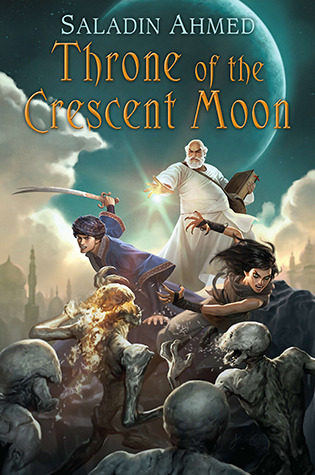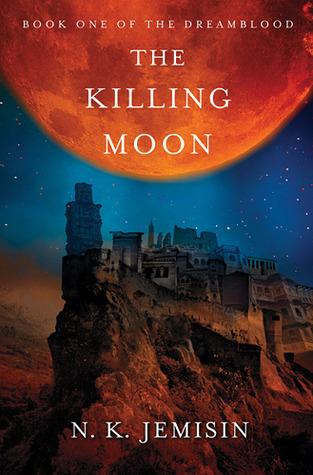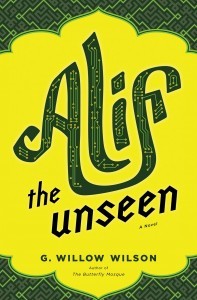The Nebula Awards are selected by the Science Fiction Writers of America (SFWA) every year and constitute the one of the two most recognizable awards in science fiction and fantasy (the other being the Hugo Awards). There are many others to pay attention to including the British Science Fiction Association (BSFA) Awards and the World Fantasy Awards, but the Hugo and Nebula are basically the big ones.
While the categories for all these awards are wide ranging, I primarily care about the novels category. The Nebulas also have a YA category which I'm conflicted about. On one hand, it highlights the excellent work of more novelists, but on the other hand, I'm not sure that I'd be giving works like Railsea by
China Miéville to anyone not capable of reading most of the things on the novel nominees list.
So the nominees for the 2012 Nebula Award (given in 2013 for works published in 2012) for best science fiction and fantasy novel are:
Throne of the Crescent Moon by Saladin Ahmed as I said in the Alif the Unseen post, I felt that this was an excellent fantasy book based in an ancient Arabian setting. The three main characters are equally fascinating, with an ancient sage and ghul hunter Doctor Adoulla Makhslood, a painfully young holy warrior Raseed bas Raseed and the young female tribeswoman Zamia who is a lion shape-changer. These three characters and an interesting supporting cast take on magic, murder and revolution in the well-realized city of Dhamsawaat.
Ironskin by Tina Connolly which I haven't read, but is now high on my to-read list. From what I've seen in reviews this book is a re-imagining of Jane Eyre in an alternate England in the aftermath of a war with the Fae. There are victims of the war who must wear iron covering Fae curses that scar their skin. The main character is a young woman who must wear an iron mask for the rest of her life for this reason. It sounds brilliant, but I'm wondering if it would be better with ninjas and vampires. I'll let you know when I read it.
The Killing Moon by N. K. Jemisin which is another book I really enjoyed from a brilliant author. Her Inheritance Trilogy were some of my favorite books in my 2011 reading. This is the first book in the Dreamblood series, with the second, The Shadowed Sun also published last year. One of the best things about Jemisin's series is that each book is a discreet story with mostly new characters but in much the same setting. This series is set in an analogue of ancient Egypt and centered around a religion/magic tradition based around dreaming, death and life force. It's really complicated, but this is one of the more nuanced approaches to dying and euthanasia that I've seen all wrapped in the trappings of a fantasy story.
The Drowning Girl by Caitlin Kiernan which I wrote about in my post on writing these book reviews. The book is written in the first person by the main character, Imp, a schizophrenic artist. She's not a little schizophrenic either; I'd describe her as barely functional, even in the saner parts of the narrative and it gets deeply weird in one part where she goes off her meds. The story also goes deep into gender/sexual identity issues as well as Imp is a lesbian, the other main character is transgender and the central figure of the mystery/ghost story/dark fantasy/whatever-the-hell-this-is story is bisexual. The whole thing rings very true as the author is transgender and is a mental illness sufferer. I heard her say in an interview that the book was harrowing and difficult to write. I get that; it's just as harrowing and difficult to read. Inarguably brilliant, but arguably enjoyable.
Glamour in Glass by Mary Robinette Kowal. This is the other book on this list that I haven't read. It's the second book in the the Glamourist Histories with the first book, Shades of Milk and Honey nominated for the Nebula last year. The third book Without a Summer, will be out in April. This is very similar to Ironskin, set in an alternate magical historical England, but it's doing Jane Austen rather than Charlotte Bronte. Very weird that such similar books got nominated, but I guess I wouldn't have blinked if Caliban's War by James S. A. Corey had been nominated along with 2312 (below) and those two are just as similar.
2312 by Kim Stanley Robinson. This is the only item on the nominee list for an award given by a science fiction writers group that is actually science fiction. I guess it's a reflection on book shelves and modern reading habits as well. The action starts with the city of Terminator on Mercury, a city that moves on rails around the entire planet, always moving to keep on the nightside of the planet. The story picks up with Swan Er Hong a typical citizen of the solar system in 2312, a hermaphrodite (as most people are) and over a century old but still quite young by the standards of the day. It just gets weirder and more imaginative from there. The plot is almost irrelevant; the point is to soak in the staggeringly complex world-building that the author has come up with here. Definitely my pick of the year and the novel I think most likely to win the award.
One more point - I feel like I'm living in 2013 when the nominee list includes four women (one of whom is African American, another of whom is transgender) and two men.
One more point - I feel like I'm living in 2013 when the nominee list includes four women (one of whom is African American, another of whom is transgender) and two men.
Currently Reading: The Girl Who Fell Beneath Fairyland and Led the Revels There by Catherynne M. Valente (It's taking me ages).


















